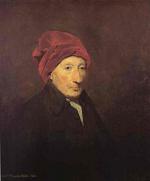Disable ads!
Thomas Reid
Thomas Reid FRSE (/riːd/; 26 April 1710 – 7 October 1796) was a religiously trained Scottish philosopher, a contemporary of David Hume as well as "Hume's earliest and fiercest critic." He was the founder of the Scottish School of Common Sense and played an integral role in the Scottish Enlightenment. The early part of his life was spent in Aberdeen and he graduated from the University of Aberdeen. He began his career as a Minister of the Church of Scotland but ceased to be a Minister (or called 'Reverend') when he was given a professorship at King's College, Aberdeen in 1752. He obtained his doctorate and wrote An Inquiry Into the Human Mind on the Principles of Common Sense (published in 1764). He and his colleagues founded the 'Aberdeen Philosophical Society' which was popularly known as the 'Wise Club' (a literary-philosophical association). Shortly after the publication of his first book, he was given the prestigious Professorship of Moral Philosophy at the University of Glasgow when he was called to replace Adam Smith. He resigned from this position in 1781, after which he prepared his university lectures for publication in two books: Essays on the Intellectual Powers of Man (1785) and Essays on the Active Powers of the Human Mind (1788). Reid was buried at Blackfriars Church in the grounds of Glasgow College and when the university moved to Gilmorehill in the west of Glasgow, his tombstone was inserted in the main building. See separate article on Thomas Reid's tombstone. Reid believed that common sense (in a special philosophical sense of sensus communis) is, or at least should be, at the foundation of all philosophical inquiry. He disagreed with Hume, who asserted that we can never know what an external world consists of as our knowledge is limited to the ideas in the mind, and George Berkeley, who asserted that the external world is merely ideas in the mind. By contrast, Reid claimed that the foundations upon which our sensus communis are built justify our belief that there is an external world. In his day and for some years into the 19th century, he was regarded as more important than Hume. He advocated direct realism, or common sense realism, and argued strongly against the Theory of Ideas advocated by John Locke, René Descartes, and (in varying forms) nearly all Early Modern philosophers who came after them. He had a great admiration for Hume and had a mutual friend send Hume an early manuscript of Reid's Inquiry. Hume responded that the "deeply philosophical" work "is wrote in a lively and entertaining matter," but that "there seems to be some defect in method," and criticized Reid for implying the presence of innate ideas.
 Read more on wikipedia.org Read more on wikipedia.org
 All quotes by Thomas Reid All quotes by Thomas Reid
 Edit Edit
|

|
|
|
|
|
Background photo by Giuliana
|